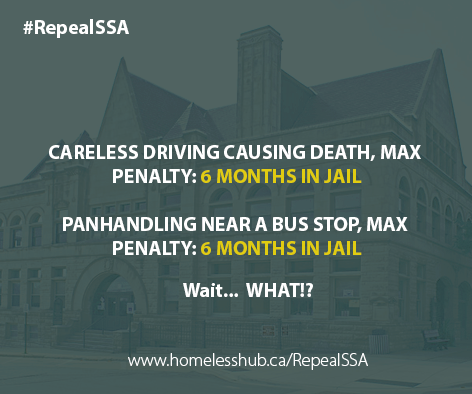When it came into force in 2000, the Ontario Safe Streets Act (SSA) was a reactionist policy to the increasing visibility of individuals experiencing homelessness across Ontario’s cities, particularly those who would panhandle or squeegee. In an effort to deter those activities, the Act prohibits solicitation in specified spaces and any solicitation in an “aggressive manner.” The fines associated with each offence can be as little as $65 and as high as $1,000.
Seventeen years later, the vaguely worded legislation has proven to have unacceptable consequences for many Ontarians experiencing homelessness. For those unfortunate enough to spend extended periods of their lives living on the streets, these minor fines can have massive effects. Advocates with Fair Change Community Legal Clinic have come across many clients with accumulated fines in the tens of thousands of dollars. Just this past fall, Fair Change made international headlines when they helped Gerry Williams successfully appeal $65,000 of crippling fines.
But tired of a piecemeal approach and disillusioned by government inaction, advocates with Fair Change have taken the battle to court, to prove that the SSA is not only unconscionable, but also unconstitutional.
The SSA and its stubborn existence is evidence of why we must rethink the way we engage our community’s most vulnerable. Beginning in the early 80s, lawmakers in many jurisdictions subscribed to the peculiar view that the best way to help the marginalized is to marginalize them further through imposing fines for partaking in the sorts of activities that they rely on.
As a province, we have sought to address poverty by criminalizing it. Although this logic may have been acceptable 30 years ago, it cannot be tolerated in 2017. Decades of legal and sociological research have demonstrated that this approach is ineffective and inefficient. A report from the Canadian Observatory of Homelessness suggests that the SSA is expensive administratively. Prosecuting the SSA costs the province approximately $2 million per year. But because the vast majority of those issued tickets under the SSA are experiencing homelessness, very few fines are collected. Between 2000 and 2010, only about $8,000 in fines were collected.
This is why many jurisdictions, which adopted this approach to policing many years ago, have long abandoned it. Yet Ontario has somehow fallen behind and this policy seems to be lost in a cycle of harmful inertia. In fact, and what’s perhaps most troubling, tickets issued under the SSA are on the rise.
As the litigation surrounding the SSA continues, we cannot forget that repealing the Act will be only one victory in the larger battle against poverty. As Ontario takes measures to avoid poverty and prevent homelessness, moving away from the SSA would be a vital step in the right direction.
People who experience homelessness are not the problem. The problem is those of us who allow homelessness to persist. So when you’re walking on the sidewalk or driving down the street and see a person experiencing homelessness, you should feel uncomfortable. But rather than burying that feeling or attributing it to the person experiencing homelessness, search for the steps that you can take to address the true problem of poverty. Start by standing against the SSA, but certainly don’t stop there.


